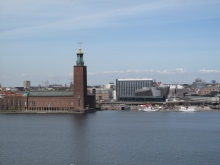
Once upon a time in the region of Baden Wuerttemberg, there was a castle on the hill with vineyards of Staufen in Breisgau, Germany.
Although the castle was destroyed during the Thirty Year's War (1618-1648) in Central Europe, the old town is still charming and well known for good wine. Many tourists come and visit the wine bar and restaurant in this little town. Walking in the city is not dangerous unless you are drunk and fall into the small gap that let the water runs through the city:
It is such a nice way of presentation to sell wine with the old time wine maker that the restaurant owner put it between the gap. Hopefully, you will not fall when you walk or run into the restaurant. It would be a bad luck! As the city is known for good wine, many restaurants have nice and cozy atmosphere for wine tasting and drinking coffee in the day time or having dinner at night:
The town museum (Stadtmuseum) is located in the town hall (Rathaus) at the town center. According to the history, the building is built in 1564.
There is an interesting object in front of the museum:
The last public execution in Staufen occured in 1828. According to the history, Swedish army took over and burnt down the castle in 1632, until 1895 the city bought the ruin castle back and rebuilt the town. (The German flag tells who belongs to this castle)
Due to the great strategic advantage, Staufen was the headquarter of the Swedish-French Army in 1643 and the headquarter of the French immigrant-Army during the French Revolution in 1792.
The view from the inside of castle shows that there were double exterior walls: (One of better defensive strategy)
The other name of this town is "Fauststadt" or City of Fist (Faust =Fist). "The legend of Faust" is written about Dr. Johann Georg Faust who is the magician or alchemist in the middle ages. The promise to provide the gold through alchemy for the Lord of Staufen is not fulfilled that led to his death in 1539. The explosion of his experiment caused his death in the restaurant "Loewen" somewhere in the city center. Actually, his death led to literature because he died of experiment--->Dr. Faust died at the place is real, the part of the deal with devil is written to make a stage play. It doesn't matter how it is. Many tourists come to this town for this:
In summer, you will certainly see this magnificent view. Wine another day!











